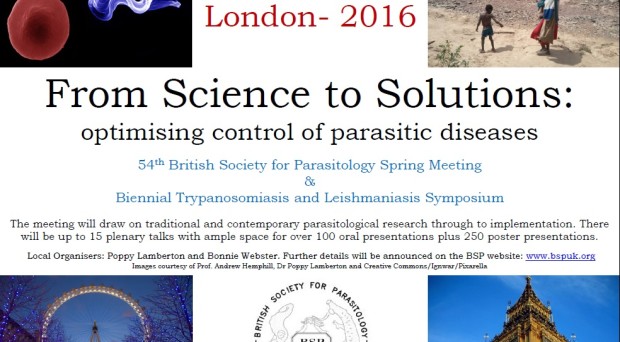
The 54th British Society for Parasitologists (BSP) Spring Meeting, From science to solutions: optimising control of parasitic diseases, was recently held at Imperial College, London. Over a three-day period, a diverse range of speakers from all around the world both educated and entertained. These included guest plenary speakers, veterinarians, postdoctoral, PhD and MSc students. Furthermore, there were opportunities to attend workshops hosted by the Sanger Institute, EMBL European Bioinformatics Institute, WormBase and The University of Warwick. This resulted in a vibrant and energetic atmosphere for all attendees, most strongly felt by the students who were eager and enthusiastic to learn more from their peers within the wonderful scientific field of Parasitology.
The BSP meeting started off with a successful ‘Student and Career’ session which comprised of three presentations from Dr Webster, Dr Gouvras and Dr Reinhard-Rupp, respectively. The session’s main focus was on women in science, their ups, downs, successes and failures and career pathways. As a woman, this session was very motivating as it brought to light how under-represented women are within science and how this has to change in the future. Generally, the presentations were very informative for all attendees (not just females) as they provided advice and encouragement on grant applications, which can be daunting, and the range of post-PhD career opportunities currently available. Feedback clearly showed that students felt this session was very beneficial to them.
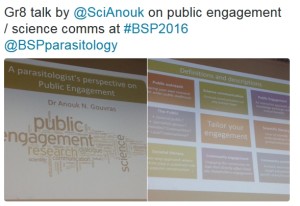
The day ended with a reception, at the Natural History Museum, which allowed everyone to mingle and interact with many research teams over a glass of wine. There were many visual aids, not all pretty I may add but these sparked considerable interest and gave a first-hand insight into the importance of the various research teams’ work.
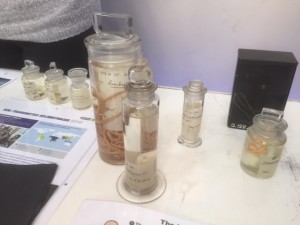
My research is focused on helminth neurobiology which influenced the sessions I attended, a number of which were very impressive. Firstly, the Keynote speaker, Dr Mario de Bono, in the session, Helminth: Signalling & Developmental Parasitology; was truly amazing. He grabbed and held the audience’s attention with his work, ‘How ambient levels of carbon dioxide and oxygen can reprogram Caenorhabditis elegans global states.’ His presentation was very informative and left the audience wanting more.
Secondly, the presentation from Mr Robert Morris, a 1st year PhD student, from Queen’s University Belfast, was outstanding. His enthusiasm was enlightening and the sheer quantity and quality of results he showcased was astonishing for a first year student. He proudly presented his results on the effects of neuropeptides on the behaviour on the Entomopathogenic nematode, Steinernema carpocapsae and I sincerely look forward to an update on his findings next year.
The second day ended with the BSPs very successful Young Parasitologists party (YPP). There was a lively and bubbly atmosphere which saw young parasitologists socialising with each other. Whilst their research was discussed, topics including fashion, future holidays and how to become a billionaire overnight, were some of the other hot topics of light-hearted debate. New friendships were forged and a combined determination to win the challenging pub quiz and bag the prize, cemented these alliances.
On the final day, the interactive WormBase ParaSite Workshop, led by the instructors Dr Bolt of EMBL-EBI and Drs Lomax and Shafie of the Sanger Institute took place. This workshop provided an opportunity to navigate through the ParaSite webpage, discover how to BLAST and be introduced to BioMart. Even though the workshop was only an hour long, it provided detailed information and links to video tutorials and was deemed a great success by all who attended.
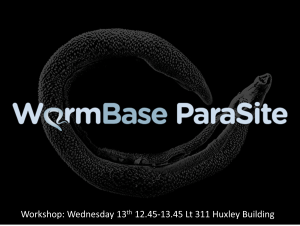
Even though unsympathetic flight times meant I had to miss the BSP’s closing event, I hear it was a great night as the pictures taken prove.
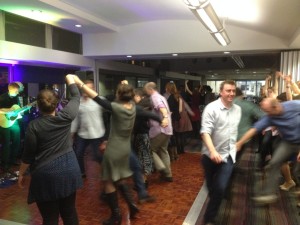
It kicked-off with Prof David Horn, firstly, being awarded the Wright Medal for his outstanding contributions to parasitology and, secondly, giving a presentation on “Decoding antitrypanosomal drug action and resistance”. The evening ended with the Gala Dinner and Ceilidh which I’m sure was a triumph and a lovely way to end a great conference. I keenly await next year’s spring meeting and already anticipate what it will have in store for us. It better be good: this year will be hard to beat!

Comments